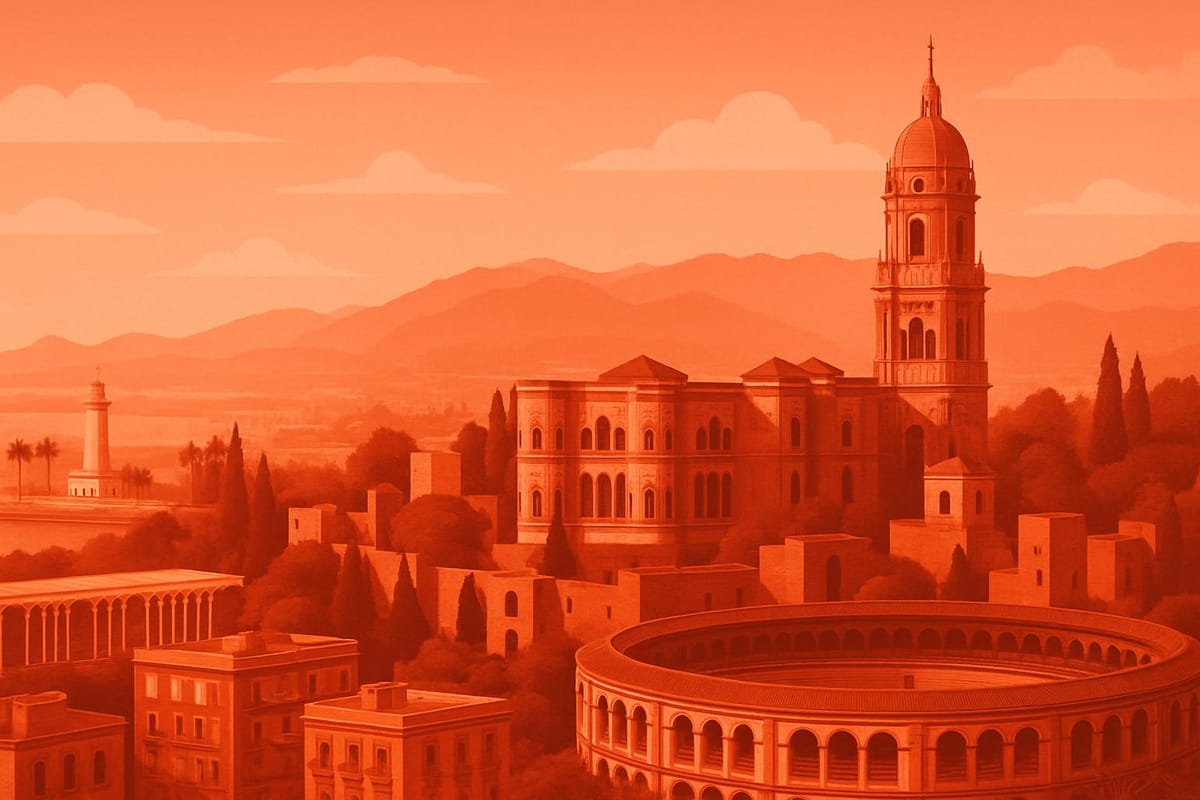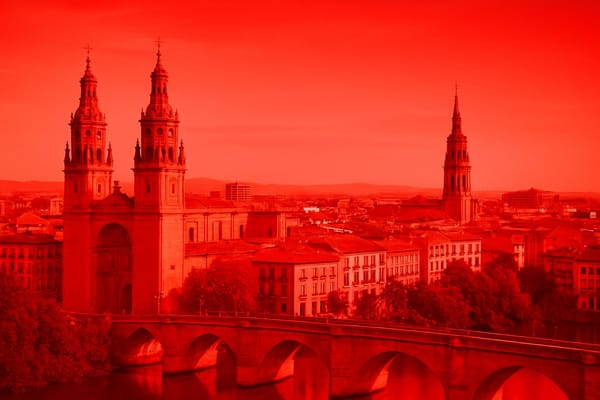Málaga
Sun-soaked beaches, Picasso museum, Alcazaba fortress, tapas & vibrant nightlife await.

Important things to know about Málaga
Málaga is a vibrant coastal city in Andalusia, Spain, where a warm Mediterranean climate shapes daily life and outdoor culture, creating a year-round rhythm that blends traditional rhythms with modern urban energy; its streets reflect a mix of old and new neighborhoods, bustling markets and quiet residential corners, while the city’s economy balances tourism with a growing emphasis on innovation, technology and creative industries, supported by universities and co-working communities that attract young professionals and international students. As a significant port and transport hub, Málaga connects the region to global trade and mobility networks, fostering business opportunities in logistics, services and digital startups; local gastronomy emphasizes fresh, seasonal produce and seafood, reflecting coastal influences and culinary traditions that permeate cafés, bars and family tables, contributing to a dynamic food scene without relying on singular tourist highlights. Cultural life is rich in festivals, music, and artisan crafts, and public spaces encourage social interaction and outdoor living; urban planning efforts aim to improve sustainability, cycling and pedestrian access, while investment in infrastructure and smart-city initiatives supports economic resilience and quality of life. Residents value a relaxed pace tempered by entrepreneurial ambition, and the combination of favorable weather, strategic location in southern Spain, and a vibrant mix of education, culture and business makes Málaga an attractive place to live, work and grow, offering a Mediterranean lifestyle that remains authentically Andalusian while evolving toward a diverse, modern future.
Sightseeing hot-spots in Málaga
Málaga is a sun-drenched city on the Costa del Sol where history and modern life mingle along narrow streets and wide boulevards. Among the top sightseeing highlights of Málaga, Spain are the impressive Alcazaba, a palatial Moorish fortress with fragrant gardens, and the adjacent Gibralfaro Castle, which rewards visitors with sweeping panoramic views over the city and Mediterranean. Archaeological remains and baroque churches punctuate the historic centre, while the imposing Catedral de Málaga - known locally as “La Manquita” - dominates the skyline and invites exploration of its ornate chapels and rooftop terraces.
The city's coastal charm is centered on the renovated port area and beaches. Strolling along Muelle Uno brings you to chic shops, waterfront restaurants, and the lively marina where yachts bob in the sun; just a short walk away, Malagueta Beach offers golden sand and relaxed chiringuitos serving fresh seafood. Food lovers will relish the bustling Atarazanas Market, where seasonal produce and Andalusian specialties set the stage for sampling tapas and local wines. Málaga’s blend of seaside leisure and culinary culture makes it an ideal stop on any Costa del Sol itinerary.
Cultural attractions further elevate Málaga as a must-see destination in Spain. The Picasso Museum, housed in a beautiful Renaissance palace, celebrates the city’s most famous native son, while the contemporary Centre Pompidou Málaga and numerous galleries showcase cutting-edge art. Wandering Calle Larios and its side streets reveals boutique shopping, lively plazas and flamenco evenings that capture Andalusia’s spirit. Easily walkable and well connected by public transport, Málaga (or Malaga, Spain) rewards visitors with a compact, varied program of history, art, gastronomy and seaside relaxation.
Hotels to enjoy in Málaga
Málaga is a vibrant destination on the Costa del Sol, and the variety of hotels in Málaga reflects its sunny, cultural appeal. From beachfront resorts with pools and spa facilities to charming boutique hotels tucked into cobbled streets near the Picasso Museum, Málaga offers accommodation for every taste. Travelers searching for Málaga hotels can choose luxury properties overlooking the Mediterranean, mid-range city center options within walking distance of the historic centre, or budget-friendly hostels and guesthouses that deliver great value. Business travelers appreciate hotels close to Málaga Airport and the trade fair, while families often prioritize family-friendly services, central locations, and easy access to the port and promenade. The blend of modern comfort and Andalusian character means guests can enjoy rooftop terraces, local cuisine, and contemporary design without sacrificing proximity to cultural attractions.
When selecting among the many hotels in Malaga, consider what matters most: proximity to beaches or museums, free parking, breakfast options, or an on-site pool. Booking early helps secure rooms at the best hotels in Málaga during high season, while last-minute deals sometimes reveal excellent cheap hotels in Málaga for flexible itineraries. Look for hotels that highlight easy transfers to Málaga Airport and rail connections, and read recent reviews focusing on cleanliness, service, and location. Whether you prefer tranquil boutique stays in the old town or lively resort hotels with evening entertainment, Málaga’s accommodation scene is designed to suit couples, families, and solo explorers alike-making it simple to find the right hotel to enhance your Andalusian experience.
Restaurants to try in Málaga
Málaga is a vibrant city on the Costa del Sol where the restaurant scene blends traditional Andalusian flavors with modern culinary trends. Strolling through the old town and the port you’ll find everything from tiny tapas bars serving plates of jamón and fried anchovies to elegant dining rooms offering creative takes on Mediterranean cuisine. Seafood is a defining feature of Málaga dining: chefs grill sardines on the beach in the classic espeto style, and local markets like Atarazanas supply restaurants with the freshest fish and seasonal produce. The diversity of restaurants in Málaga means you can enjoy a casual lunch of pescaito frito in Pedregalejo, a tasting menu in a contemporary bistro, or a family-run place where recipes have been handed down for generations. This mix of authenticity and innovation makes Málaga a top destination for food lovers seeking both classic Andalusian dishes and inventive culinary experiences.
When exploring the best restaurants in Málaga, look for places that emphasize local ingredients, olive oil, and wines from nearby Spanish regions to complement the flavors. Many venues focus on sustainability and small-batch suppliers, showcasing the island-like freshness of the Mediterranean. Dining times are relaxed, and the city’s gastronomic calendar includes lively food festivals and market events that highlight emerging chefs and traditional producers. Whether you’re researching Málaga restaurants for a weekend getaway or planning a longer culinary tour, prioritizing seaside chiringuitos for seafood and the historic center for tapas will give you an authentic taste of Málaga’s rich food culture. Enjoying these tastes against the backdrop of warm Andalusian hospitality is what makes eating out in Málaga truly memorable.
Best shopping stops in Málaga
Málaga is a vibrant destination for shopping in Málaga, where the mix of traditional markets and modern retail makes the city a must-visit for style and souvenirs. Strolling down Calle Larios in the Málaga Centro reveals stylish Spanish fashion, chic designer boutiques, and international brands that appeal to trendsetters and casual shoppers alike. For food lovers, the Mercado Central de Atarazanas offers an authentic taste of Andalusia with fresh fish, olive oil, local wines, and artisan cheeses-perfect for finding gourmet food gifts and regional delicacies. The historic center’s narrow streets are dotted with shops selling ceramics, flamenco accessories, and handmade local crafts, while vintage and concept stores in Málaga’s Soho neighborhood are ideal for discovering unique pieces and sustainable fashion.
For a more leisurely shopping experience, the waterfront area around Muelle Uno blends open-air promenades with stylish stores, seafood restaurants, and scenic views of the port, making it easy to combine shopping and sightseeing. Outlet options and larger department stores like El Corte Inglés provide convenience for those hunting bargains or familiar brands, and pop-up artisan markets and seasonal fairs add variety throughout the year. Whether you’re searching for beachwear, luxury goods, or thoughtful souvenirs, the shopping highlights of Málaga balance tradition and modernity, ensuring visitors find memorable items that capture the spirit of Andalusia.
Nightlife highlights in Málaga
Málaga is famed for its vibrant Málaga nightlife, where centuries-old charm meets modern energy along the Puerto de Málaga and the narrow streets of the historic center. As the sun sets, the tapear culture comes alive: clusters of tapas bars spill onto plazas like Plaza de la Merced and Calle Larios, offering local wine, sherry and fresh seafood. The Soho district adds a creative twist with contemporary galleries and cocktail lounges, while beachfront neighborhoods such as La Malagueta and Pedregalejo host relaxed chiringuitos and lively beach bars. For visitors seeking a mix of tradition and trend, evenings can move from intimate flamenco shows to trendy rooftop bars overlooking the Mediterranean, showcasing the best of Malaga bars and coastal nightlife.
For late-night excitement, Malaga clubs and live music venues cater to diverse tastes, from electronic DJ sets to acoustic jazz nights and authentic flamenco performances that capture Andalusian soul. Strolling the illuminated waterfront toward the port, you’ll find stylish lounges and bustling terraces where locals and tourists mingle until dawn; the city’s late-night hours mean the party often peaks after midnight. Whether you prioritize gourmet tapas hopping, sunset cocktails by the sea, or dancing in a crowded club, Málaga nightlife delivers a memorable blend of culture, cuisine and coastal ambiance that keeps visitors returning.
Getting around in Málaga
Málaga offers excellent connectivity between Málaga Airport (AGP) and the city thanks to a reliable mix of rail and road options: the airport is linked by the Cercanías suburban train with regular services to Málaga María Zambrano station, where passengers can change for high-speed AVE services to Madrid, Seville and other major cities or continue on regional RENFE trains; the train connection makes transfers fast and predictable, reducing the need for taxis and easing access to the city center and coastal towns like Fuengirola, while frequent buses and licensed taxis provide alternative routes and late-night travel. Travelers benefit from integrated ticketing options at the station and clear signage in English and Spanish, making it straightforward to plan onward journeys by rail or road. For visitors and locals alike, the combined airport and train infrastructure supports efficient tourism and business travel, with modern platforms, luggage-friendly services and competitive travel times that keep Málaga a top choice for those seeking convenient access to the Costa del Sol and the broader Spanish rail network.
Culture must-see's in Málaga
Málaga is a vibrant cultural capital on the Costa del Sol where history and contemporary life meet. Strolling through the historic centre, visitors encounter the Roman Theatre, the majestic Alcazaba and Castillo de Gibralfaro perched above the city, and the striking Renaissance cathedral that anchors Málaga’s architectural story. The art scene is especially notable: the Museo Picasso Málaga celebrates the city’s most famous son Picasso while modern institutions like the Centre Pompidou Málaga and the Museo Carmen Thyssen add cutting-edge exhibitions and permanent collections. Galleries, street art and creative hubs spill into neighborhoods, ensuring that Málaga, Spain is both a museum city and a living canvas, where studio visits, artisan markets and open-air performances cultivate a constantly evolving cultural landscape.
Beyond monuments and museums, Málaga’s cultural highlights include year-round festivals, music and culinary traditions that draw international visitors. The city’s calendar peaks with Semana Santa processions and the exuberant Feria de Málaga, while smaller music and film festivals keep the scene dynamic. Flamenco shows in intimate tablaos, classical concerts at restored theaters and pop-up art events create ample reasons for cultural tourism. Málaga’s gastronomy-from beachside espetos to innovative tapas and local sweet wines-complements museum-hopping with memorable food experiences. Strolling down Calle Larios, visiting the port’s cultural spaces and sampling local produce give a full sensory portrait of why Málaga remains a top destination for culture lovers seeking authentic Spanish heritage and contemporary creativity.
History of Málaga
The history of Málaga stretches back over 2,800 years and is a rich tapestry that reflects the changing tides of the Mediterranean world. Founded by the Phoenicians as a trading post, the city on the Costa del Sol quickly became a strategic port where goods, ideas, and cultures converged. Under Roman rule Málaga developed urban infrastructure, including roads, baths, and an amphitheater, vestiges of which still intrigue visitors and researchers today. The era of Moorish domination left an indelible mark on the cityscape, with the construction of the Alcazaba and the fortress of Gibralfaro, emblematic of a sophisticated Islamic culture that fostered agriculture, arts, and scholarship. When the Catholic Monarchs reconquered Málaga in 1487, the city entered a new phase marked by religious conversion, demographic shifts, and the integration into emerging Spanish imperial networks. Over the centuries Málaga oscillated between periods of prosperity and hardship, with the Renaissance and early modern periods producing notable architecture and cultural life, while later centuries saw the city adapt to the pressures of global trade, political turmoil, and changing economic systems.
In the 19th and 20th centuries the history of Málaga was reshaped by industrialization, waves of migration, and the cultural renaissance that produced figures such as Pablo Picasso, whose legacy transformed Málaga into an international point of artistic pilgrimage. The turbulent years of the Spanish Civil War and subsequent Francoist era left their scars, but also spurred urban and social changes that set the stage for contemporary revival. Today Málaga balances respect for its layered past with a dynamic present focused on tourism, innovation, and cultural industries, harnessing its heritage sites, museums, and vibrant port to attract millions of visitors while nurturing local community life. Efforts in heritage preservation and sustainable development aim to protect archaeological sites and historic neighborhoods even as the city modernizes its infrastructure and economy. The enduring story of Málaga, Spain is one of resilience and reinvention: a Mediterranean city whose past continues to inform its identity and drive its future, making the history of Málaga a compelling chapter in the broader narrative of Spanish and Mediterranean history.



